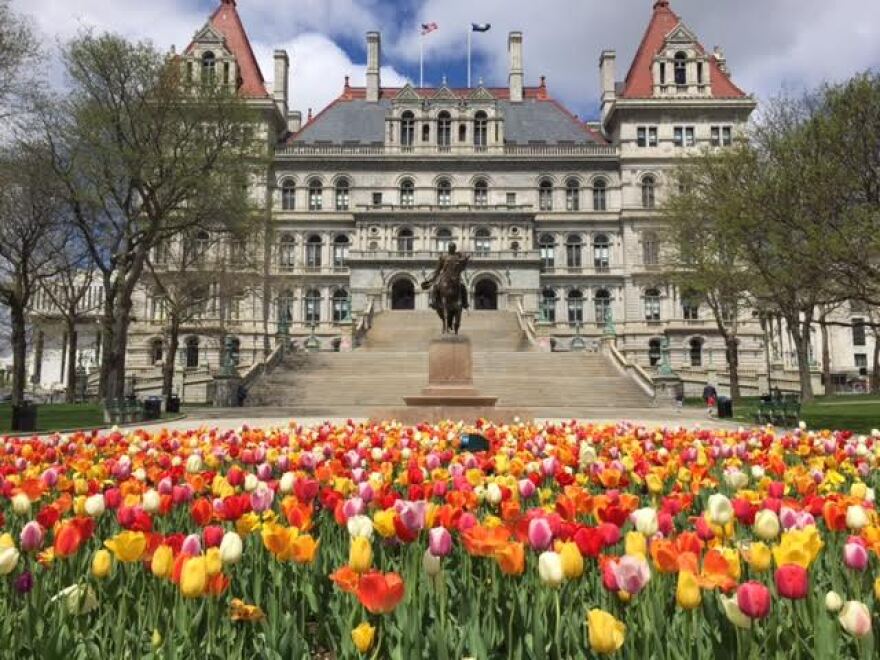With one week to go before the New York state budget deadline, Governor Andrew Cuomo and legislative leaders are at odds over key points of the spending plan, including whether to raise taxes on the wealthy and corporations by $7 billion. Meanwhile, the Assembly Speaker is refuting a claim by Cuomo that the speaker’s COVID-19 diagnosis might make the budget late.Cuomo says his budget office has identified $5 billion in new sources of revenue, which they were not previously aware of. His budget director, Robert Mujica, says that, combined with the $12.5 billion coming to New York from the recently enacted federal stimulus measure, will be enough to avert raising any new taxes in the new state budget and to avoid spending cuts.
“We have the resources necessary so that there would be no cuts in the governor’s budget,” Mujica said on March 22. “So you wouldn’t require any significant level of tax increases to pay for any of the restorations.”
The budget office says tax revenue is $2.5 billion higher than initially projected, and the state will be receiving $1.5 billion more in federal Medicaid funding, as well as another $1 billion in unanticipated federal aid.
The new resources will restore $3.7 billion in proposed cuts to schools and local governments, and end a wage freeze for state workers.
Cuomo, a Democrat, proposed a temporary income tax increase on New Yorkers making $5 million or more, but has worried that raising taxes on the wealthy will cause them to leave the state. He says that tax hike is no longer needed.
Democrats, who lead both houses of the legislature, want to enact $7 billion in new taxes on the wealthy and corporations, including new higher income tax brackets for multi-millionaires and billionaires, higher capital gains and inheritance taxes, and a pied-à-terre tax for luxury second homes.
Senate Leader Andrea Stewart-Cousins says she’s grateful to the state’s congressional delegation for delivering the funds. But she says the federal money runs out next year, and the state needs a more permanent and stable source of revenue.
“It takes care of what happened to us during COVID,” said Stewart-Cousins. “It does not account for the deficit that we had before and our ability to make sure that we have the funding for education and health care and the things that we really care about.”
250 New York business leaders, including all of the state’s Chambers of Commerce and many of New York’s largest employers, wrote a letter to Stewart-Cousins and Assembly Speaker Carl Heastie, asking them not to raise taxes, saying it will delay economic recovery from the pandemic. In the letter, they say “significant corporate and individual tax increases will make it far more difficult to restart the economic engine and reassemble the deep and diverse talent pool that makes New York the greatest city in the world.”
Stewart-Cousins says rebuilding a vibrant economy isn’t just about keeping taxes low, it’s also about making investments in communities that are struggling, and providing needed services.
“We are asking those who have a little more, to do a little more,” Stewart-Cousins said. “So that we are not looking at the same inequities, year after year.”
A coalition of labor unions and left-leaning advocacy groups who favor increasing taxes on the wealthy recently released a study that found New York’s more than 120 billionaires increased their wealth by $88 billion during the pandemic. At the same time, 4.5 million New Yorkers lost their jobs, many permanently.
Since the governor first introduced his budget plan in January, the power dynamics between himself and the legislature have shifted. Cuomo is engulfed in multiple scandals, including allegations by 8 women of sexual harassment and inappropriate behavior. He is under federal investigation for a potential cover-up of nursing home deaths during the pandemic.
Stewart-Cousins has called on the governor to resign. Speaker Heastie has launched an impeachment inquiry. Both houses have supermajorities of Democrats that could potentially override any objections the governor might have to their budget proposal.
But Cuomo on Wednesday said it might be the fault of the legislature if an agreement falls through and the budget is late.
Heastie said Tuesday that he has a mild case of coronavirus, and will continue budget negotiations remotely as he recovers. The governor says some of the speaker’s top staff will now have to be in quarantine, and that will “complicate” the budget process.
“I’m not going to risk public heath to get it done April 1,” Cuomo said Wednesday.
Heastie, in a Tweet, immediately disputed Cuomo’s assertion that his illness could make the budget late, saying “my COVID diagnosis and any quarantine of staff will not affect budget negotiations.” A spokesman, Mike Whyland, adds that the speaker is feeling “very good.”
Cuomo, asked about Heastie’s response, backed down from his claim, saying he meant that not as many people can gather in a room, due to COVID restrictions, to hash out a budget plan.








